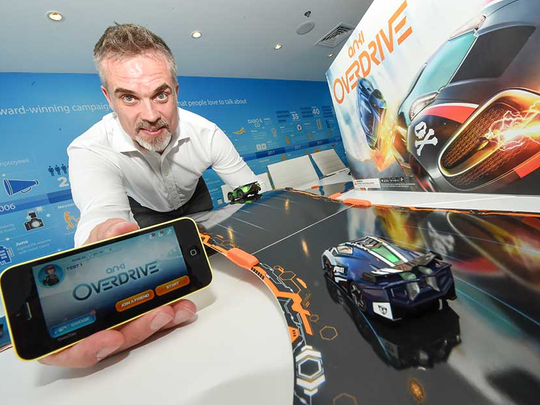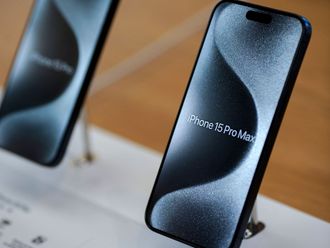
Dubai: Gone are the days of fixed tracks for app-steered cars and now players can build their own custom tracks using pieces, and expandable, that easily snap together using magnet to stay on the ground.
Connected toys have raised their game and are becoming mainstream.
Remember Sphero BB-8, the app-enabled robotic ball, which was the Star Wars toy to have when Episode VII hit theatres last year.
Now many companies are entering into the robotics and artificial intelligence space to give a new dimension and one such company is US-based Anki.
“We have been in the market for around three years. We appeared in the public eye at Apple Worldwide Developers Conference 2013 when Apple CEO Tim Cook stood up at the stage and revealed our company for the first time,” Stuart Collingwood, general manager for Anki Europe, Middle East and Africa, told Gulf News.
He said the reason why Cook revealed Anki was because no other company was doing like the way “we were doing with robotics and iOS” at that time and Apple was excited.
The company launched Drive in 2013, its modernised take on slot cars and where the mat is rolled out and cars rolled over them.
Now, the company’s second-generation — Anki Overdrive — is not only a toy but also a video game brought to life. It is like a Mario Car brought to live.
Daimler’s former Smart Car designer designed the Anki cars.
“Our goal is to bring robotics and artificial intelligence into everybody’s daily lives. Artificial intelligence will gain traction as some companies, like Facebook, are already using it to look at the data and build better services to the users. So much of investment is going to this space,” he said.
All of the AI and robotic software the company writes is “reusable” in other applications and be used in lot of other products.
“We have a long-term ambition to build consumer robotics company,” he said.
All of the Anki’s AI cars have different characters, programmed with different features and weapons. These cars talk to the phone and each other’s cars using Bluetooth Low Energy and on Android or Apple smartphones and tablets.
Four people can play a game or a single person can play against three robotic cars.
Players can build their own battle-race courses within seconds and pit their real-life robotic supercars against their friends or step up against enemy AI commanders and their crews in the game’s campaign mode.
The Anki Overdrive Starter Kit, priced at Dh899 and available in summer, comes with four straight segments of track and six 90-degree curves, battery charger and two cars. These cars can run up to 25 minutes on a single charge.
The cars, scan the polypropylene ink track before the game to learn the route using a camera underneath the car, and then during the race they can detect their place on the track, as well as the other cars.
It has a 50MHz processor and two engines for two wheels. The tracks never need to be flat and can be raised also.
“In robotics, we are solving three problems — where am I, what am I doing and what am I going to do next. We have already clocked 3.2 million kilometres of racing,” Collingwood said.
The Drive was launched in 2013 in the US and the UK in 2014. The Overdrive was in the US, UK and Germany and Dubai is the fourth market to be launched.
Players earn points by winning the race and these points can be redeemed to customise the car and add more features, weapons and more tricks.
Players can use weapons like guns, lasers and electromagnetic pulses but it is not physical projectiles.
“I am excited about the opportunity in the UAE as people love smartphones, gaming and cars. It feels like it should be a good market for us. In London, we have a strong Arab market as people go there for purchases,” he said.










